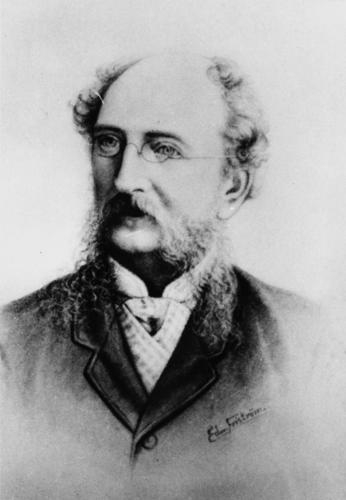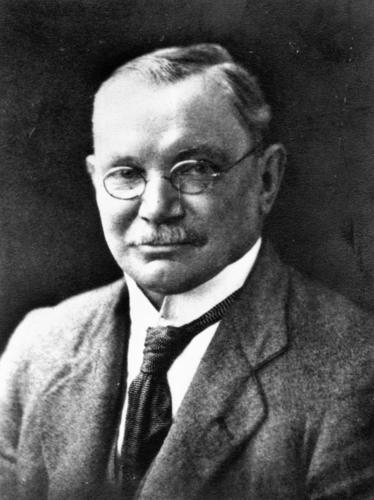"I wish't yeh meant it, Bill." Oh, 'ow me 'eart
Went out to 'er that ev'nin' on the beach.
I knoo she weren't no ordinary tart,
My little peach!
I tell yeh, square an' all, me 'eart stood still
To 'ear 'er say, "I wish't yeh meant it, Bill."
To 'ear 'er voice! Its gentle sorter tone,
Like soft dream-music of some Dago band.
An' me all out; an' 'oldin' in me own
'Er little 'and.
An' 'ow she blushed! O, strike! it was divine
The way she raised 'er shinin' eyes to mine.
'Er eyes! Soft in the moon; such boshter eyes!
An' when they sight a bloke ... O, spare me days!
'E goes all loose inside; such glamour lies
In 'er sweet gaze.
It makes 'im all ashamed uv wot 'e's been
To look inter the eyes of my Doreen.
The wet sands glistened, an' the gleamin' moon
Shone yeller on the sea, all streakin' down.
A band was playin' some soft, dreamy choon;
An' up the town
We 'eard the distant tram-cars whir an' clash.
An' there I told 'er 'ow I'd done me dash.
"I wish't yeh meant it." 'Struth! And did I, fair?
A bloke 'ud be a dawg to kid a skirt
Like 'er. An' me well knowin' she was square.
It 'ud be dirt!
'E'd be no man to point wiv 'er, an' kid.
I meant it honest; an' she knoo I did.
She knoo. I've done me block in on 'er, straight.
A cove 'as got to think some time in life
An' get some decent tart, ere it's too late,
To be 'is wife.
But, Gawd! 'Oo would 'a' thort it could 'a' been
My luck to strike the likes of 'er? ... Doreen!
Aw, I can stand their chuckin' off, I can.
It's 'ard; an' I'd delight to take 'em on.
The dawgs! But it gets that way wiv a man
When 'e's fair gone.
She'll sight no stoush; an' so I 'ave to take
Their mag, an' do a duck fer 'er sweet sake.
Fer 'er sweet sake I've gone and chucked it clean:
The pubs an' schools an' all that leery game.
Fer when a bloke 'as come to know Doreen,
It ain't the same.
There's 'igher things, she sez, for blokes to do.
An' I am 'arf believin' that it's true.
Yes, 'igher things -- that wus the way she spoke;
An' when she looked at me I sorter felt
That bosker feelin' that comes offer a bloke,
An' makes 'im melt;
Makes 'im all 'ot to maul 'er, an' to shove
'Is arms about 'er ... Bli'me? But it's love!
That's wot it is. An' when a man 'as grown
Like that 'e gets a sorter yearn inside
To be a little 'ero on 'is own;
An' see the pride
Glow in the eyes of 'er 'e calls 'is queen;
An' 'ear 'er say 'e is a shine champeen.
"I wish't yeh meant it," I can 'ear 'er yet,
My bit o' fluff! The moon was shinin' bright,
Turnin' the waves all yeller where it set --
A bonzer night!
The sparklin' sea all sorter gold an' green;
An' on the pier the band -- O, 'Ell! ... Doreen!
First published in The Bulletin, 30 September 1909;
and later in
The Songs of a Sentimental Bloke by C.J. Dennis, 1915.
Author reference sites: C.J. Dennis, Austlit, Australian Dictionary of Biography, Australian Poetry Library
See also.
Went out to 'er that ev'nin' on the beach.
I knoo she weren't no ordinary tart,
My little peach!
I tell yeh, square an' all, me 'eart stood still
To 'ear 'er say, "I wish't yeh meant it, Bill."
To 'ear 'er voice! Its gentle sorter tone,
Like soft dream-music of some Dago band.
An' me all out; an' 'oldin' in me own
'Er little 'and.
An' 'ow she blushed! O, strike! it was divine
The way she raised 'er shinin' eyes to mine.
'Er eyes! Soft in the moon; such boshter eyes!
An' when they sight a bloke ... O, spare me days!
'E goes all loose inside; such glamour lies
In 'er sweet gaze.
It makes 'im all ashamed uv wot 'e's been
To look inter the eyes of my Doreen.
The wet sands glistened, an' the gleamin' moon
Shone yeller on the sea, all streakin' down.
A band was playin' some soft, dreamy choon;
An' up the town
We 'eard the distant tram-cars whir an' clash.
An' there I told 'er 'ow I'd done me dash.
"I wish't yeh meant it." 'Struth! And did I, fair?
A bloke 'ud be a dawg to kid a skirt
Like 'er. An' me well knowin' she was square.
It 'ud be dirt!
'E'd be no man to point wiv 'er, an' kid.
I meant it honest; an' she knoo I did.
She knoo. I've done me block in on 'er, straight.
A cove 'as got to think some time in life
An' get some decent tart, ere it's too late,
To be 'is wife.
But, Gawd! 'Oo would 'a' thort it could 'a' been
My luck to strike the likes of 'er? ... Doreen!
Aw, I can stand their chuckin' off, I can.
It's 'ard; an' I'd delight to take 'em on.
The dawgs! But it gets that way wiv a man
When 'e's fair gone.
She'll sight no stoush; an' so I 'ave to take
Their mag, an' do a duck fer 'er sweet sake.
Fer 'er sweet sake I've gone and chucked it clean:
The pubs an' schools an' all that leery game.
Fer when a bloke 'as come to know Doreen,
It ain't the same.
There's 'igher things, she sez, for blokes to do.
An' I am 'arf believin' that it's true.
Yes, 'igher things -- that wus the way she spoke;
An' when she looked at me I sorter felt
That bosker feelin' that comes offer a bloke,
An' makes 'im melt;
Makes 'im all 'ot to maul 'er, an' to shove
'Is arms about 'er ... Bli'me? But it's love!
That's wot it is. An' when a man 'as grown
Like that 'e gets a sorter yearn inside
To be a little 'ero on 'is own;
An' see the pride
Glow in the eyes of 'er 'e calls 'is queen;
An' 'ear 'er say 'e is a shine champeen.
"I wish't yeh meant it," I can 'ear 'er yet,
My bit o' fluff! The moon was shinin' bright,
Turnin' the waves all yeller where it set --
A bonzer night!
The sparklin' sea all sorter gold an' green;
An' on the pier the band -- O, 'Ell! ... Doreen!
First published in The Bulletin, 30 September 1909;
and later in
The Songs of a Sentimental Bloke by C.J. Dennis, 1915.
Author reference sites: C.J. Dennis, Austlit, Australian Dictionary of Biography, Australian Poetry Library
See also.


